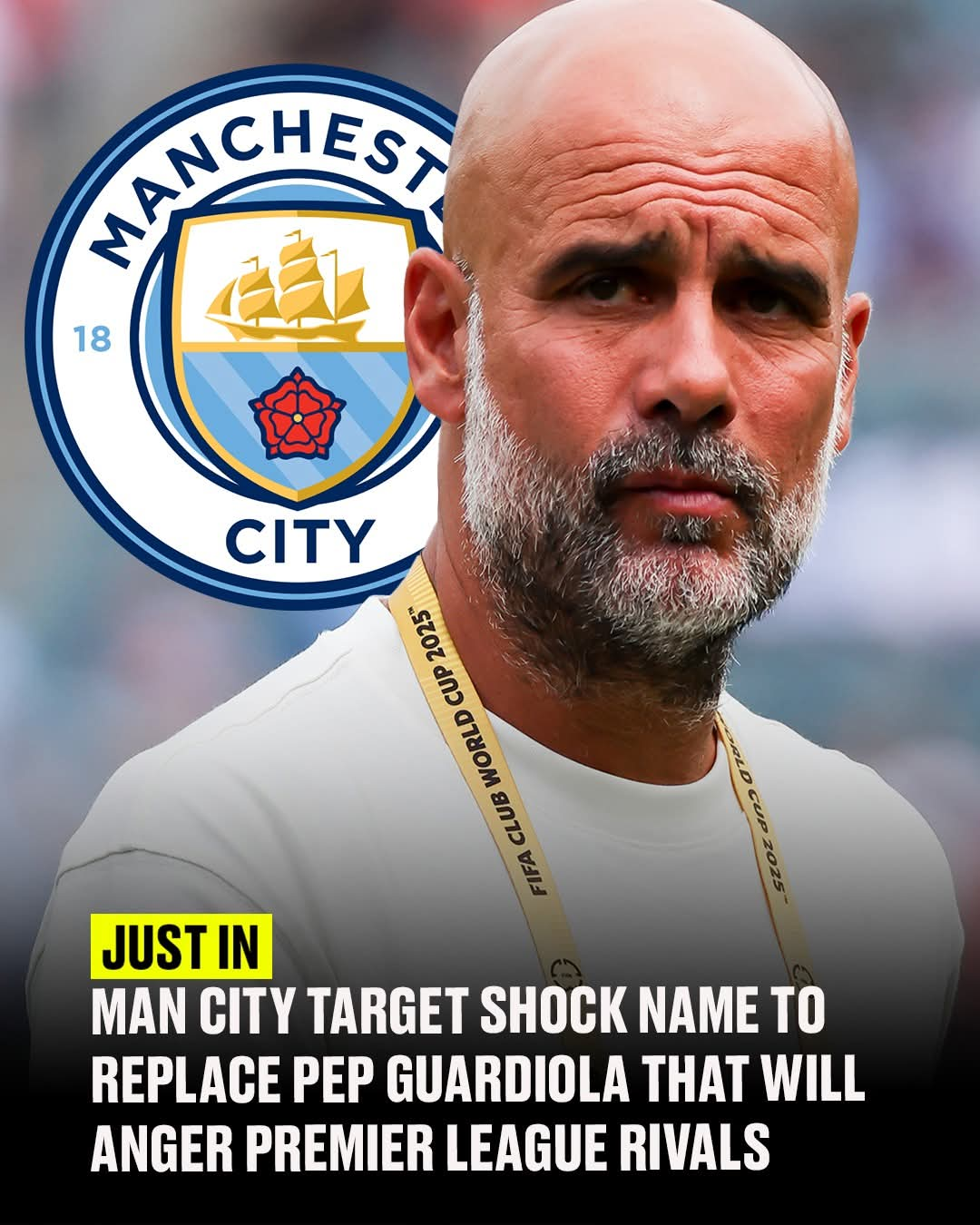Man City eyeing former Arsenal star as potential Pep Guardiola successor

Manchester City finds itself in an unprecedented position of vulnerability and transition. For the first time in four years, the sky-blue half of Manchester enters a new Premier League campaign without the coveted champions’ badge adorning their shirts. The psychological impact of this shift cannot be understated – it represents not just a loss of silverware, but a fundamental crack in the foundation of dominance that Pep Guardiola has so meticulously constructed over his tenure at the Etihad Stadium.
Liverpool’s resurgence under Arne Slot has served as a stark reminder that even the most successful dynasties are not immune to the cyclical nature of football. The Merseyside club’s triumph in Slot’s inaugural season demonstrates how quickly fortunes can change in the Premier League, where tactical evolution and squad dynamics can shift the balance of power in a single campaign. This changing of the guard has forced Manchester City’s hierarchy to confront an uncomfortable truth: even Pep Guardiola’s tactical genius cannot guarantee perpetual success.
The 2024-25 season proved to be a sobering experience for City supporters who had grown accustomed to their team’s relentless pursuit of perfection. The third-place finish behind both Liverpool and Arsenal represented more than just a statistical disappointment – it was a clear indication that the club’s previously unassailable domestic supremacy was showing signs of strain. The Champions League elimination at the hands of Real Madrid added another layer of frustration, while the FA Cup final defeat to Crystal Palace served as a particularly bitter pill to swallow for a team that had made final appearances seem routine.
The injury to Rodri emerged as the defining narrative of Manchester City’s turbulent season, exposing the delicate balance that underpins even the most sophisticated tactical systems. The Spanish midfielder’s absence created a domino effect that rippled through every aspect of City’s play, from their defensive solidity to their attacking fluidity. His unique combination of defensive awareness, passing range, and tactical intelligence had become so integral to Guardiola’s system that his injury essentially forced the team to reinvent their entire approach to matches.
The Rodri situation highlighted a broader issue within City’s squad construction – the over-reliance on key individuals whose absence can derail even the most carefully laid plans. While Guardiola’s tactical flexibility has been one of his greatest strengths throughout his career, the Spanish midfielder’s injury proved that some players are simply irreplaceable within certain systems. The ripple effects of his absence were felt not just in terms of results, but in the team’s overall rhythm and confidence.
This dependency on key players raises important questions about succession planning not just for the managerial position, but for the entire squad structure. As City looks toward the future, the need for greater depth and tactical versatility has become apparent. The club’s executives understand that any future manager will need to address these structural vulnerabilities while maintaining the high standards that have defined the Guardiola era.
Despite the mounting speculation about his future and the natural exhaustion that comes with managing at the highest level for extended periods, Pep Guardiola’s decision to sign a two-year contract extension in November 2024 represented a crucial moment in Manchester City’s recent history. The extension, which keeps him at the club until June 2027, provided much-needed stability during a period of uncertainty while simultaneously giving the club’s hierarchy valuable time to plan for the inevitable transition.
Guardiola’s admission that he had seriously considered leaving at the end of the 2024-25 season offers fascinating insight into the psychological toll of managing at the elite level. The decision to stay was not born from complacency or lack of options elsewhere, but from a deep-seated commitment to the project he has spent years building. His choice to extend his stay demonstrates both his loyalty to the club and his understanding of the importance of timing in major transitions.
The two-year timeframe of the extension is particularly significant as it provides a natural endpoint that allows for proper succession planning. Rather than leaving the club in a state of uncertainty, Guardiola’s extended commitment ensures that any transition can be managed carefully and deliberately. This approach reflects the methodical nature that has characterized his entire tenure at City, where every decision is made with long-term consequences in mind.
Manchester City’s approach to succession planning appears to be heavily influenced by the Barcelona model, which has historically emphasized continuity of philosophy and tactical approach rather than radical change. This philosophy recognizes that successful transitions require more than just appointing a competent manager – they demand a deep understanding of the club’s culture, tactical preferences, and long-term objectives.
City’s executives have observed how Barcelona’s most successful managerial appointments have come from within their own ecosystem, where managers already understand the club’s methodology and expectations. This approach minimizes the risk of cultural misalignment and ensures that the transition period is as smooth as possible. The emphasis on continuity also helps maintain player confidence and reduces the likelihood of major squad overhauls that can disrupt team chemistry.
The club’s scouting network for potential managers extends far beyond traditional coaching credentials to include factors such as tactical philosophy, man-management skills, and cultural fit. This comprehensive approach reflects the understanding that managing Manchester City requires a unique blend of tactical sophistication, media savvy, and ability to handle the pressure that comes with managing one of the world’s most scrutinized football clubs.
The emergence of Cesc Fabregas as a potential successor to Pep Guardiola represents one of the most intriguing developments in modern football management speculation. The former Spanish international’s inclusion on City’s shortlist might seem surprising given his limited managerial experience, but a deeper analysis reveals why he has captured the attention of the club’s decision-makers.
Fabregas brings a unique combination of attributes that align perfectly with Manchester City’s succession criteria. His playing career provided him with extensive experience in the Premier League through his spells at Arsenal and Chelsea, giving him intimate knowledge of the league’s tactical nuances and media pressures. His time at Barcelona, particularly his development through the famous La Masia academy, instilled in him the same philosophical approach to football that has defined both Guardiola’s and Mikel Arteta’s managerial careers.
The Spanish midfielder’s transition from player to manager at Como has been closely monitored by scouts and executives across Europe. His ability to implement a possession-based, tactical approach at a club with limited resources demonstrates the kind of adaptability and innovation that would be essential for managing Manchester City. The fact that he guided Como to a respectable 10th-place finish in Serie A, while maintaining attractive football, suggests that he possesses the tactical acumen necessary to succeed at the highest level.
The influence of Barcelona’s La Masia academy on modern football cannot be overstated, and its impact on Manchester City’s succession planning is becoming increasingly apparent. The academy’s emphasis on technical skill, tactical intelligence, and possession-based football has produced a generation of players and coaches who share a common footballing language and philosophy.
Fabregas’s development through La Masia places him in the same educational lineage as both Guardiola and Arteta, creating a natural philosophical alignment that could prove crucial in maintaining continuity at Manchester City. This shared background means that Fabregas already understands the tactical concepts and training methodologies that have been central to City’s success under Guardiola.
The La Masia connection also extends to the way these coaches approach player development and squad management. The academy’s emphasis on nurturing young talent while maintaining high performance standards aligns perfectly with Manchester City’s long-term strategy of developing players through their academy system while competing at the highest level. Fabregas’s experience as both a product and later a mentor within this system provides him with unique insights into effective player development
Mikel Arteta’s position as Arsenal manager creates a fascinating dynamic in Manchester City’s succession planning. His successful transition from Guardiola’s assistant to Premier League manager provides a compelling case study for how the philosophical principles developed at City can be successfully implemented elsewhere. Arteta’s achievements at Arsenal, including their sustained challenge for the Premier League title, demonstrate the effectiveness of the tactical approach that City hopes to maintain.
The relationship between Arteta and Fabregas, forged through their shared La Masia background and subsequent careers, could play a crucial role in any potential appointment. Arteta’s insights into both the demands of Premier League management and the specific challenges of transitioning from the Barcelona/City tactical system could prove invaluable in Fabregas’s development as a manager.
Furthermore, Arteta’s success in implementing a possession-based, tactically sophisticated approach at Arsenal while competing directly with Manchester City provides a blueprint for how former Barcelona players can successfully adapt their philosophical approach to English football. His ability to maintain tactical principle while adapting to the specific demands of Premier League football offers important lessons for any potential successor to Guardiola.
Cesc Fabregas’s work at Como represents more than just his first managerial appointment – it serves as a crucial proving ground for his tactical philosophy and leadership abilities. The Italian club’s modest resources and expectations have provided him with the perfect environment to develop his managerial skills without the intense pressure that comes with managing at the highest level.
The 10th-place finish achieved by Como under Fabregas’s guidance might seem modest, but it represents significant progress for a club that had been struggling in the lower divisions. More importantly, the style of football implemented by Fabregas has caught the attention of observers across Europe, with many noting the clear tactical sophistication and attacking intent that characterizes his approach.
Como’s long-term project, which Fabregas has publicly embraced, demonstrates his commitment to sustainable development rather than short-term success. This patient approach to building something lasting aligns perfectly with Manchester City’s own philosophy of gradual improvement and long-term planning. The fact that Fabregas has resisted approaches from bigger clubs, including interest from Inter Milan, suggests that he understands the importance of completing his education in a supportive environment.
Fabregas’s transition from world-class player to promising manager represents a fascinating study in tactical evolution. His playing career provided him with unique insights into the demands of different tactical systems, from Arsène Wenger’s fluid attacking approach at Arsenal to the more structured systems he encountered at Barcelona and Chelsea.
As a player, Fabregas was renowned for his ability to dictate the tempo of matches through his passing and positional awareness. These same qualities that made him successful as a player – vision, tactical intelligence, and leadership – are now being translated into his managerial approach. His understanding of the game from a player’s perspective provides him with credibility when working with current players and helps him communicate tactical concepts effectively.
The transition from player to manager is never guaranteed to be successful, but Fabregas’s early work at Como suggests that he possesses the intellectual curiosity and tactical sophistication necessary to succeed at the highest level. His willingness to adapt his approach based on the resources available while maintaining core tactical principles demonstrates the kind of flexibility that would be essential for managing Manchester City.
One of Fabregas’s most significant advantages as a potential Manchester City manager is his extensive experience as a player in the Premier League. His spells at Arsenal and Chelsea provided him with intimate knowledge of the league’s unique demands, from the intensity of the fixtures to the tactical approaches employed by diffrent teams.
This Premier League experience would be invaluable in helping him understand the specific challenges that Manchester City faces in domestic competition. The league’s physical demands, tactical evolution, and media scrutiny create a unique environment that can be difficult for managers to adapt to. Fabregas’s familiarity with these challenges would allow him to hit the ground running in a way that might not be possible for managers without Premier League experience.
Furthermore, his success as a player at both Arsenal and Chelsea demonstrates his ability to perform under pressure in English football. The fact that he was able to maintain high performance standards at two of the Premier League’s biggest clubs suggests that he possesses the mental fortitude necessary to handle the intense scrutiny that comes with managing Manchester City
The reported interest from Inter Milan in appointing Fabregas as their manager represents significant validation of his potential as a top-level coach. Inter’s status as one of Europe’s elite clubs, combined with their recent Champions League final appearance, suggests that their interest is based on genuine belief in his abilities rather than speculative appointment.
The fact that Fabregas chose to remain at Como despite Inter’s interest demonstrates his commitment to his current project and his understanding of the importance of proper career development. This decision suggests a level of maturity and strategic thinking that would be essential for managing Manchester City, where the pressure to deliver immediate results can be overwhelming.
Inter’s interest also provides important context for understanding Fabregas’s reputation within the football world. The fact that a club of Inter’s stature would consider him for their managerial position suggests that his work at Como has been more impressive than might be apparent from simply looking at league position and results.
Manchester City’s succession planning reflects a broader philosophy of patience and long-term thinking that has characterized the club’s approach under their current ownership. Rather than rushing into a decision or being swayed by short-term pressure, the club appears committed to identifying the right candidate and allowing for proper preparation and transition.
This patient approach recognizes that the transition from Guardiola to any successor will be one of the most significant moments in the club’s recent history. The decision cannot be made lightly or based solely on short-term considerations. Instead, it requires careful evaluation of candidates’ philosophical alignment, tactical sophistication, and ability to handle the unique pressures of managing Manchester City.
The inclusion of Fabregas on the shortlist, despite his limited managerial experience, demonstrates the club’s willingness to think creatively about succession planning. Rather than simply appointing an established manager with a proven track record, City appears open to identifying candidates with the potential to grow into the role while maintaining the tactical principles that have defined their recent success.
As Manchester City navigates this period of transition, the potential appointment of Cesc Fabregas represents more than just a managerial change – it symbolizes the club’s commitment to maintaining the tactical sophistication and philosophical approach that has defined their recent success. The La Masia connection, Premier League experience, and demonstrated tactical acumen make him a compelling candidate for one of football’s most demanding positions.
The role that Mikel Arteta could play in this transition, through his shared background and proven success in adapting Barcelona’s principles to English football, adds another layer of intrigue to the succession planning process. The interconnected nature of these relationships reflects the increasingly sophisticated approach to football management in the modern era.
Whether Fabregas ultimately succeeds Guardiola remains to be seen, but his inclusion on Manchester City’s shortlist represents a fascinating development in the ongoing evolution of football management. The combination of playing experience, tactical intelligence, and philosophical alignment creates a compelling case for his candidacy, while his work at Como provides a valuable foundation for future success.
The coming months will likely provide further insights into Manchester City’s succession planning, but the emergence of Fabregas as a candidate demonstrates the club’s commitment to maintaining the high standards and tactical sophistication that have defined the Guardiola era. As the football world watches with interest, the potential appointment of the Spanish coach could mark the beginning of a new chapter in Manchester City’s remarkable recent history.















